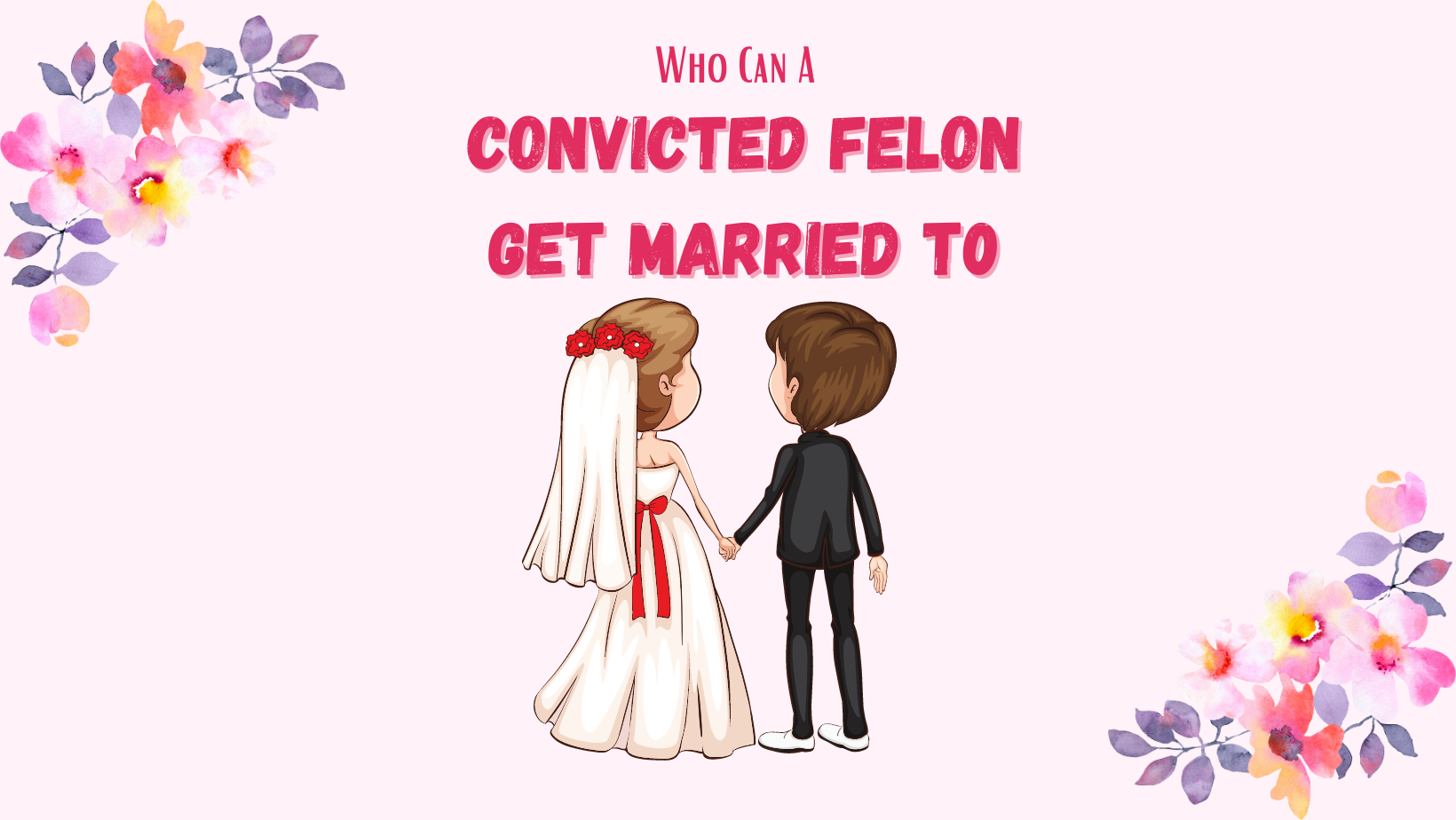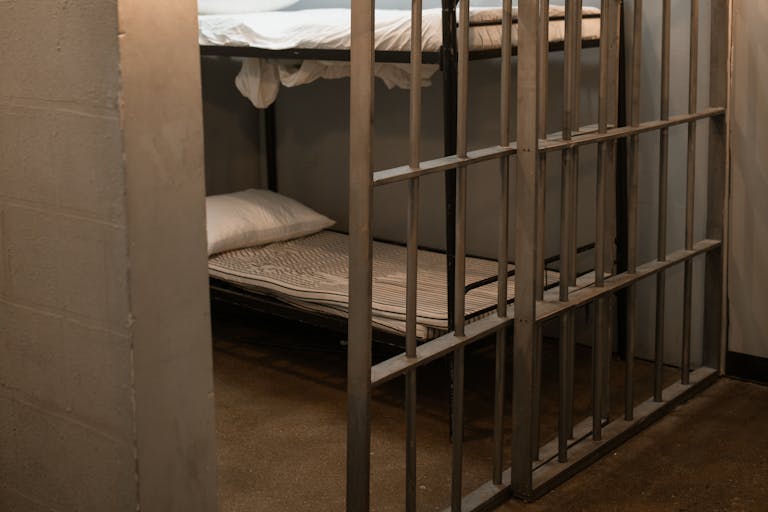How Will Marrying a Felon Affect Me? (Who Can a Convicted Felon Get Married To)
Updated:2024
Introduction
By definition, marriage is a formal union and legally binding contract between two loving individuals that spiritually, economically, and emotionally unites their lives forever. Unfortunately, as a convicted felon, we all know that legal issues follow.
We also know that many opportunities and privileges are forever taken away from you when you have a criminal record. Here we explore the plight of the convicted felon enjoying the God-given right to enjoy their relationship and get married to whom they choose, free from repercussion.
In this post, we ask the burning question – Who can a felon get married to? How will marrying a felon affect me? What is the social stigma? How does this affect my well-being?
Can an immigrant marry a felon?
Yes, according to United States law, an immigrant has the right to marry a felon. Felons must have all possible documents to support the marriage though.
U.S. Citizenship and Immigration Services (USCIS) conducts a thorough background check and security clearance on both the U.S. citizen sponsor (in this case the person with the criminal history) and the person seeking a green card.
Under United States immigration law, only certain crimes for offenses against a minor will disqualify the would-be sponsor (felon) from marriage for a green card.
Can a police officer marry a felon?
A felony record by one’s spouse will likely be revealed during the pre-employment screening and background check and may affect the strength of your candidacy relative to all other applicants for the position, as police employment can be highly competitive.
So, to answer the question: It depends. With most localized departments nowadays engaged in very sophisticated, in-depth background checks of a potential candidate for the job, the likelihood is there may be rules or a code of conduct in place to prohibit something like this from occurring.
This is a bit of a grey area, as no law per se precludes a person whose one partner is a felon from attaining post certification or employment as a peace officer, however putting it into practice may yield a different result and may be a deal breaker as one must think of the logistical challenges that take place when knowing and associating with criminals poses risk, along with having a firearm in the home.
Also, it is common practice for someone with a felony conviction to establish relationships with those who are involved in law enforcement, with the belief that the criminal would gain favor and acquire access to confidential police information that aids in their criminal enterprise. With such a possibility and potential consequences existing, you may see the rationale behind having preventative measures set forth.
Can someone in the military marry a felon?
Yes, military members are allowed to be in relationships and marry a felon, as there are no laws governing military marriage, and can marry whomever they want, including same-sex partners for that matter.
The felon is also authorized to receive a military spousal I.D. card and receive the benefits of a normal spouse.
There are no restrictions under federal law, but if the felony requires sex offender registration, some states restrict whether one could live on base, and is also dependent on clearance level. Military members who want more information on this rule can consult their base legal services office.
Can a gun owner marry a felon?
Yes. Generally speaking, felons are still allowed to associate with, be around, and marry someone who owns a gun; however, this can get a bit complicated if the gun itself is present, or if the person who owns the gun lives with the convicted felon because they are asking for trouble.
In all counties, a convicted felon cannot own, be in the same place with, or use a firearm, even if the firearm is legal or legally owned by another individual in the household.
There are no exceptions to this, and one (felon or not) should be aware and check with their state laws and local municipality for further clarification, as they all differ in terms of rules and regulations.
Once again, you are putting yourself in danger and are asking for trouble by not understanding the severity of the situation. Please seek counsel as the last thing in any relationship that anyone wants is to end up in jail as a result of poor choices.
Can a lawyer marry a felon?
Yes, the lawyer may marry a felon. Although the bar application can be very complex and the background checks extremely thorough, they generally ask the applicant about him or herself, and not about their personal lifestyle and partner choices.
Notwithstanding, from the perspective of a conflict of interest, you may also want to seek clarification by reading the Application for Admission, because this relationship has the potential to become an issue and be challenged by the Character Committee and Board, thus impacting the counsel’s ability to practice as a lawyer.
Can a doctor marry a felon?
Yes, a doctor can marry a felon but this should not affect his medical license on a professional level because this is a personal matter.
Felony convictions are not all the same, so as with medical licensure, considerations are made on a case-by-case basis by medical schools’ admissions committees and practices, but once again, marrying a felon should have no bearing on one’s medical career and well-being.
Can a politician marry a felon?
Yes, they can. There is no law stating that a politician or political candidate cannot marry whom they choose.
Furthermore, there is a general code of conduct one adheres to when running for public office that adheres to uphold integrity and independence, and nowhere does it state that marrying someone with a felony conviction is not allowed or tolerated.
Ironically enough, this may even help their political aspirations or election chances as it would be used as a statement piece due to social stigma and a platform on justice reform.
Can a teacher marry a felon?
The simple answer is yes, but it gets a bit more complicated when going further. The fact that your spouse was convicted of a felony should have no bearing on your teaching ability, however, others may not see it the same way.
Anything associated with the development and well-being of kids (or the public at large) certainly carries much more attention for scrutiny and judgment of personal choices and is of a delicate nature. That said, if a relationship involves someone with a criminal record, you should review your collective bargaining agreement.
If not a member of a union, your employment is probably at will, in which case it may not be correct to terminate your employment, but it may motivate someone of authority to suggest such. Your district may have an individual issue with marrying a felon, but that is up to them.
The level of concern will depend strongly on the circumstances of the act committed (violent crime/convicted murderer), and the big thing here would be if anyone related to your job found out, such as students, their parents, or faculty/staff, they could be pretty upset, and although wrong, it is very possible to have an effect on your employment.
Although everyone deserves a second chance, society and social stigma is still very much real when it comes to being in a relationship with someone having a criminal history.
If you experience any negative employment action, contact an employment lawyer in your area for counsel.
Conclusion
You are allowed to marry anyone you want in this life (and rightfully should and be free from repercussions). The big caveat though when marrying a felon, are the strings that are attached: the heavy toll and trouble the relationship will go through and suffer when you marry (and even date) someone with a criminal record or with “legal issues”.
Make no mistake, there are potential consequences when marrying someone convicted of a felony, and will affect the family.
You may not realize, but you are essentially judged before anyone meets your spouse, with the complications impacting your life both professionally and personally.
Although you lose no rights per se, from a practical legal matter, you will have some prejudice and concerns towards you, your spouse, and possibly any children by society in general if it is learned that the spouse is a convicted felon.
Still, though, it is up to you to overcome the challenges associated with two committed people in love (felon or not), and not allow that to interfere with the life you share with another.








One Comment